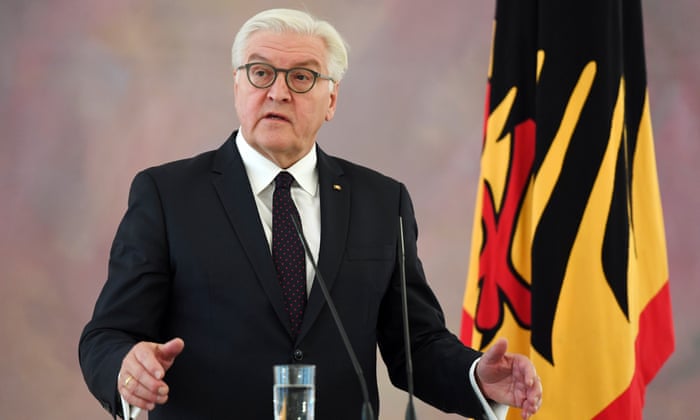A Brief Colonial History Of Ceylon(SriLanka)
Sri Lanka: One Island Two Nations
A Brief Colonial History Of Ceylon(SriLanka)
Sri Lanka: One Island Two Nations
(Full Story)
Search This Blog
Back to 500BC.
==========================
Thiranjala Weerasinghe sj.- One Island Two Nations
?????????????????????????????????????????????????Friday, November 24, 2017
Analysis: Merkel looks secure for now despite coalition chaos
 Paul Carrel-NOVEMBER 23, 2017
Paul Carrel-NOVEMBER 23, 2017 BERLIN (Reuters) - Chancellor Angela Merkel’s conservatives are rallying around her despite the failure of talks to form a three-way ruling coalition, buying her time in office and putting the onus on her Social Democrat rivals to break Germany’s political impasse.
FILE PHOTO: German
Chancellor Angela Merkel attends a session of the Bundestag in Berlin,
Germany, November 21, 2017. REUTERS/Axel Schmidt/File Photo
Resolute conservative support for Merkel is significant, as some members
of the Social Democratic Party (SPD) have said privately their price
for a re-run of its ‘grand coalition’ with the conservatives would be
Merkel’s head.
The collapse late on Sunday of the coalition talks, which followed an
inconclusive Sept. 24 election, has plunged Germany into the worst
political crisis since the end of World War Two.
President Frank-Walter Steinmeier, who is trying to broker a deal, is
keenly aware the source of Germany’s international clout is its economic
power and that businesses want a stable coalition soon to end the
uncertainty and avoid another poll.
SPD leader Martin Schulz, whose party is the second biggest in Germany
and was the junior coalition partner to Merkel’s conservative bloc in
the last parliament, has insisted the SPD should rebuild in opposition
after heavy losses in September.
But with Merkel secure for now at the helm of her Christian Democrats
(CDU), the pressure shifts to the SPD to help form a coalition after the
failure of the chancellor’s three-way talks with the liberal Free
Democrats (FDP) and Greens.
Surveys suggest going to the polls again would deliver a similar outcome
to September’s result. Furthermore, 58 percent of voters want Merkel to
remain chancellor, an Infratest Dimap poll for broadcaster ARD showed
this week.
‘NUMBER ONE’
“One thing is clear: Angela Merkel’s position in the CDU is very strong.
She is our Number One,” David McAllister, a CDU executive committee
member, told Reuters.
Her party believes she did all she could to forge a three-way coalition.
Merkel’s efforts also improved ties with the CDU’s Bavarian allies in
the conservative bloc, the Christian Social Union (CSU), which had been
strained over immigration.
Another senior CDU official said there was no question of sacrificing Merkel as the party had no credible alternative.
A third senior CDU official, Volker Kauder, leader of the conservative
parliamentary group in the lower house of parliament, said he hoped the
Social Democrats would change their minds about rejecting another grand
coalition.

German President Frank-Walter
Steinmeier gives a statement after a meeting with Chancellor Angela
Merkel, as coalition government talks collapsed in Berlin, Germany,
November 20, 2017.
REUTERS/Axel Schmidt
Asked about the possibility of the SPD supporting a Merkel-led minority
government or entering a new grand coalition, an SPD spokesman pointed
to Schulz’s meeting with Steinmeier and said, “then we will see what
comes afterwards”.
SUCCESSION QUESTION
Only after a new government has formed is Merkel’s position likely to come under pressure - and even then, not immediately.
German Chancellor Angela Merkel gestures at a CDU/CSU parliamentary group meeting at the Bundestag in Berlin, Germany, November 20, 2017. REUTERS/Axel Schmidt
Merkel, 63, only decided to run again last November after thinking long
and hard. She said then she was seeking to stay on “if health allows”.
In 1998, she was quoted as saying: “I don’t want to be a half-dead wreck
when I leave politics.”
She appears in robust health, but given she has already held power for
12 years, questions will inevitably arise about who will succeed her
before she is half way through any new four-year term. Potential
successors are not circling just yet.
“She will have probably a year or so after a government is formed before
the question of her succession becomes an overwhelming issue in German
domestic politics,” said Jan Techau at the American Academy in Berlin.
“The moment that starts, her power will be greatly diminished.”
But first, Merkel must form a new government. If Steinmeier fails to
convince the SPD to enter a new grand coalition, other options include a
three-way coalition after all, a Merkel-led minority government, or new
elections.
“Since snap elections won’t change relative strengths, my prediction is
... another grand coalition between the only two parties that have
learned to compromise,” said Josef Joffe, publisher-editor of weekly Die
Zeit.
Bild newspaper reported on Wednesday that some SPD deputies were now
questioning their party’s rejection of a renewed grand coalition.
Changing course and teaming up with Merkel again may require a change of
leadership at the SPD and there could yet be a shake out at a party
conference in early December.
“The pressure needs to build up within the Social Democratic party,” said Techau.
